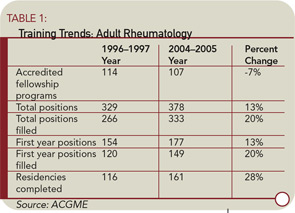“There are big sacrifices in the beginning, but overall I am happy with what I am doing and hope that in a few years I will catch up financially,” says Giovanni Franchin, MD, who recently completed his rheumatology fellowship at Columbia University in New York City.
A recent survey of rheumatology fellows across the country shows that these young physicians are happy with their choice but have lingering concerns about financial issues that may arise, says survey author John Fitzgerald, MD, an adult rheumatologist at UCLA Medical Center in Los Angeles, and a member of the ACR young investigator subcommittee.
Residency and Fellowship Trends
The workforce study takes a retrospective review of adult and pediatric rheumatology positions for the past 10 years, beginning in 1996. See Tables 1 and 2 for a summary of rheumatology training trends.
“In our supply model, our baseline assumption is that rheumatology fellowship positions and fill rates will remain constant at the 2004–2005 level,” according to the workforce study report. “Comparing the number of first-year fellows to the number completing the program between 1996 and 2005 suggests that adult and pediatric rheumatology have a high completion rate, approaching 100%,” says Dr. Birnbaum. “These data indicate that about 161 fellows in adult rheumatology and nine fellows in pediatric rheumatology entered the market in 2005.”
Dr. Birnbaum notes that another important supply issue is the number of international medical school graduates (IMGs) who fill these fellowship programs. The study report shows that the percentage of IMGs has decreased significantly in both adult and pediatric rheumatology from 1997 to 2005, from 52% to 33% among adult fellowships and from 33% to 20% in pediatrics. IMGs represented a high of 63% in the 1998–1999 group of adult fellowships and a high of 57% in the 2000–2001 group of pediatric fellowships.
Dr. Birnbaum says the key question is whether these IMGs remain in the U.S. after completing their residency training. “While we do not have detailed information concerning fellows in rheumatology, per se, based on data from August 2004 reported in the Journal of the American Medical Association [2005;294:1129-1136], about 50% of IMGs are, in fact, U.S. citizens or have permanent residency status across all graduate medical education programs,” the report surmised. “While there is no data on precisely what proportion of IMGs do, in fact, ultimately practice in the United States, the consensus view of experts is that most ultimately do remain in the United States,” the report said. “Based on our discussions with experts at the Bureau of Health Professions and elsewhere, we estimate that about 80% of IMGs practice in the United States,” it concluded.




